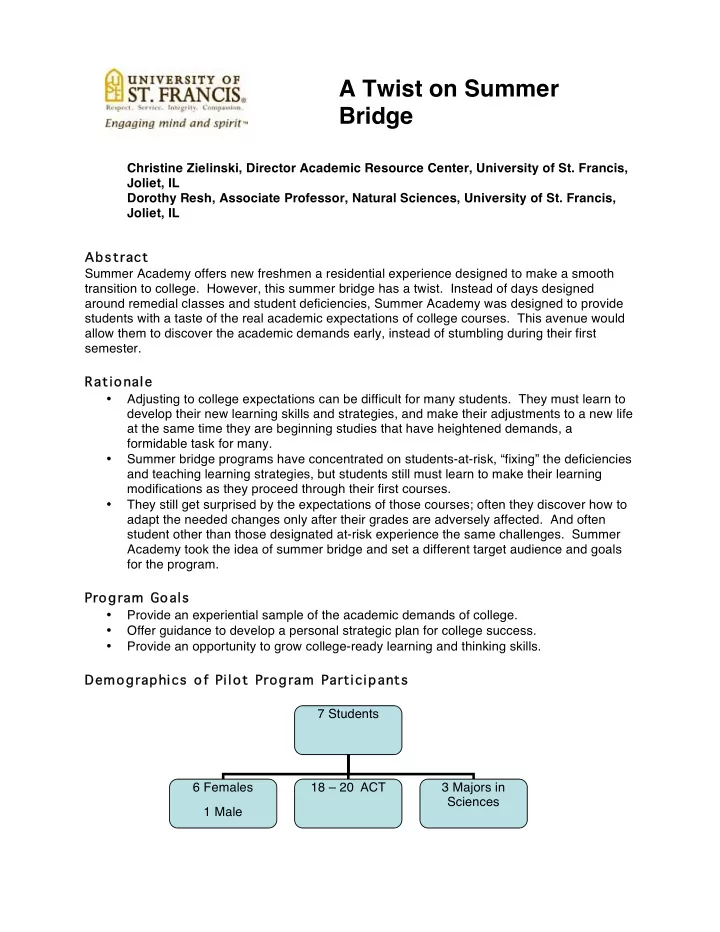

A Twist on Summer Bridge Christine Zielinski, Director Academic Resource Center, University of St. Francis, Joliet, IL Dorothy Resh, Associate Professor, Natural Sciences, University of St. Francis, Joliet, IL Abstract Summer Academy offers new freshmen a residential experience designed to make a smooth transition to college. However, this summer bridge has a twist. Instead of days designed around remedial classes and student deficiencies, Summer Academy was designed to provide students with a taste of the real academic expectations of college courses. This avenue would allow them to discover the academic demands early, instead of stumbling during their first semester. Rationale • Adjusting to college expectations can be difficult for many students. They must learn to develop their new learning skills and strategies, and make their adjustments to a new life at the same time they are beginning studies that have heightened demands, a formidable task for many. • Summer bridge programs have concentrated on students-at-risk, “fixing” the deficiencies and teaching learning strategies, but students still must learn to make their learning modifications as they proceed through their first courses. • They still get surprised by the expectations of those courses; often they discover how to adapt the needed changes only after their grades are adversely affected. And often student other than those designated at-risk experience the same challenges. Summer Academy took the idea of summer bridge and set a different target audience and goals for the program. Program Goals • Provide an experiential sample of the academic demands of college. • Offer guidance to develop a personal strategic plan for college success. • Provide an opportunity to grow college-ready learning and thinking skills. Demographics of Pilot Program Participants 7 Students 18 – 20 ACT 6 Females 3 Majors in Sciences 1 Male
Program Components • Multidisciplinary course for credit instead of developmental course team taught by faculty from five different disciplines • Student-centered faculty who represent a range of disciplines and teaching styles • Living on campus • Study skills, strategies and guidance woven into and through the course. • Assignments that include reading, writing, a presentation, and cooperative learning • Variety of assessments: test, writing, presentation • Social activities • Activities to increase self understanding of strengths • All freshmen invited, not only at-risk students • Low cost: small fee for the course and program deposit returned in form of Bookstore Gift Card Course Segments with Learning Objectives
Assessment Piloted in August 2008, evaluations were collected from the participating students and faculty at the end of the program. A second student evaluation was conducted at the end of the first semester. Finally, GPA ’ s at the end of fall semester were collected. Student Evaluations at end of program Self Reported Changed Behavior Interacted better with others “way harder than high school” Didn ’ t slack as much “they can be strict in certain areas” Tried to sit in front of the class “just what I did in high school isn't gonna cut it Tried to do everything in advance here” Student Evaluations at end of the fall semester 5: A great deal 4: Large Amount 3: Some 2: Little 1: Very Little Offered guidance on how to meet some of the expectations of college All answered 4 or 5 All answered 3 or 4 Questions about providing a sample of reading, writing, demands, or interactions expected in college Results / Grades at end of fall semester ⇒ 6 successful students with GPA ’ s which ranged from 2.53 to 3.76 ⇒ 4 students earned at least a 3.0 or higher ⇒ 1 student academically dismissed; due to personal problems and poor choices of peers Future Direction • University committed resources to expand program • Students from first year will serve as mentors to new students • Earlier start in the day to allow ice-breakers before the first meal • Follow up fall activity • Increased connection between students and faculty and other university members References 1. J.S. Smith. “Do First Year College Students ’ Expectations Align with their First Year Experience?” NASPA Journal, Vol. 42, no. 2, 153 -174 (2005) 2. S.M.Pancer et al. “Cognitive Complexity of Expectations and Adjustment to University in First Year.” Journal of Adolescent Research Vol 15, No. 1 38-57(2000) 3. G. Kuh et al. “Student Success in College ’ Creating Conditions That Matter” Czielinski@stfrancis.edu Dresh@stfrancis.edu
Recommend
More recommend